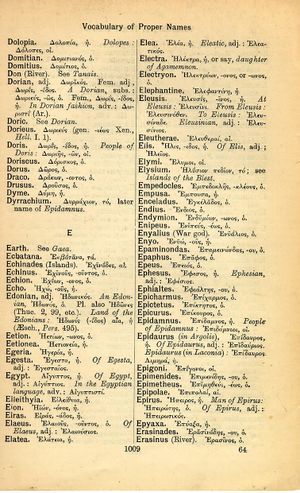Ephesus
μηδενὶ συμφορὰν ὀνειδίσῃς, κοινὴ γὰρ ἡ τύχη καὶ τὸ μέλλον ἀόρατον → never mock a disaster, fate is common to all and the future unknown
English > Greek (Woodhouse)
Ἔφεσος, ἡ.
Ephesian, adj.: Ἐφέσιος.
Latin > English (Lewis & Short)
Ĕphĕsus: i, f., = Ἔφεσος,
I an old and celebrated commercial city of Ionia, with a temple to Diana, now ruins near the village of Ayasaluk, Mel. 1, 17, 2; Plin. 5, 29, 31, § 131 sqq.; Plaut. Bacch. 2, 1, 2; 2, 3, 75; 102; 4, 9, 124 et saep.—Derivv.,
II Ĕphĕsĭus, a, um, adj., Ephesian: Diana, Plaut. Bacch. 2, 3, 73; id. Mil. 2, 5, 1; Cic. Div. 1, 23 fin.: mater, born at Ephesus, id. Phil. 3, 6, 15: pecunia, deposited in the temple there, Caes. B. C. 3, 33 fin.; 3, 105, 1. —Subst.: Ephesii, ōrum, m., the Ephesians, Plaut. Bacch. 2, 3, 75; Cic. Tusc. 5, 36, 105; Plin. 34, 8, 19, § 58 al.
Latin > French (Gaffiot 2016)
Ĕphĕsus,¹¹ ī, f. (Ἔφεσος), Éphèse [ville d’Ionie, célèbre par son temple de Diane] : Pl. Bacch. 171 ; Plin. 5, 131 || -sĭus, a, um, d’Éphèse : Cic. Div. 1, 47 || -sĭī, ōrum, m., Éphésiens, habitants d’Éphèse : Cic. Tusc. 5, 105.
Latin > German (Georges)
Ephesus (-os), ī, f. (Ἔφεσος), eine der zwölf Ionischen Städte in Kleinasien, berühmt durch den Dianentempel u. später durch Rhetorenschulen, j. Dorf Ayasaluk (d.i. Ἅγιος Θεόλογος, ein Beiname des Apostels Johannes), Plaut. Bacch. 171. Liv. 37, 45, 2 u. 19. Mela 1. § 88. Tac. dial. 15. – Dav. Ephesius, a, um (Εφέσιος), ephesisch, Cic. – Plur. subst., Ephesiī, ōrum, m., die Einw. von Ephesus, die Epheser, Plin.

